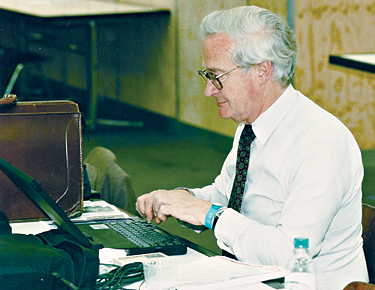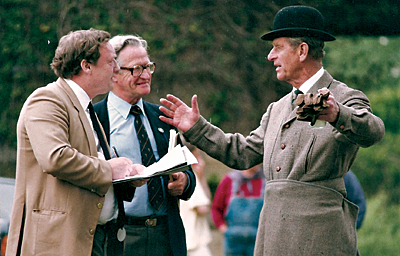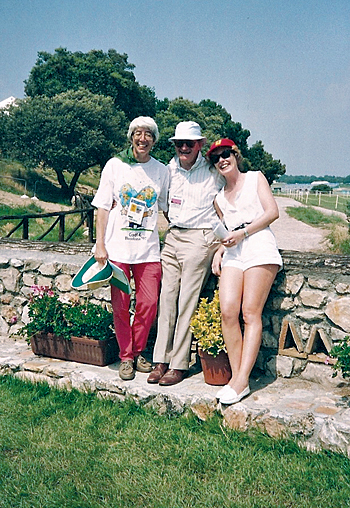In Hong Kong, this veteran reporter will wrap up his fourth decade of covering Olympic equestrian events.
Everyone loves a Cinderella story, and British sports reporter Alan Smith is no exception. Having covered equestrian events at every Summer Olympic Games since 1972 (except in 1980, when Great Britain and other countries boycotted the Moscow Games), Smith possesses a vast wealth of anecdotal recollections. But one memory from eight years ago is particularly poignant.
“It happened at the Sydney Olympics, in 2000,” recalled 74-year-old Smith, a reporter for the London-based Daily Telegraph newspaper since 1960. “The most emotional equestrian event that year was the individual show jumping, where Dutch riders Jeroen Dubbeldam and Albert Voorn took gold and silver. This occurred despite their having been told ahead of time, by teammates as well as by others, that they really weren’t good enough to even be there. So when Jeroen and Albert finished first and second, they were in tears. It was excellent.”
 But Smith remembers heartbreak too—at least from a loyal Brit’s perspective. At the 1984 Summer Games in Los Angeles, British rider Michael Whitaker had advanced to the jump-off in the individual show jumping aboard Overton Amanda. The chance to win Great Britain’s first gold medal in that particular event was within Whitaker’s grasp. But alas, it was not to be.
But Smith remembers heartbreak too—at least from a loyal Brit’s perspective. At the 1984 Summer Games in Los Angeles, British rider Michael Whitaker had advanced to the jump-off in the individual show jumping aboard Overton Amanda. The chance to win Great Britain’s first gold medal in that particular event was within Whitaker’s grasp. But alas, it was not to be.
“Amanda hit the first two elements and refused at the last,” Smith recounted. “Michael dropped from equal first [against eventual winner Joe Fargis on the U.S. horse Touch Of Class] to finish 24th.
“Afterward,” Smith continued, “Michael and team manager Ronnie Massarella were almost in tears—the Whitaker brothers [John and Michael] came from near to where Ronnie lived in Yorkshire and were almost like sons to him—but they nevertheless came up to the press room to tell us about it. By the end, we British journalists were also almost in tears. This would have been a huge achievement for Britain, but all the more so because Michael was, and is, not just a great rider but a real sportsman.”
The Early Years
Smith’s indisputable passion for the Olympic Games—as well as for the other equestrian events he’s
covered in his lifetime—developed during his London childhood, when Smith’s father passed along his love and knowledge of horse racing to his son.
“My father suffered ill health for most of his life,” Smith said. “He would have loved to have been a racing journalist, but that was never possible.”
The younger Smith, however, took a first step in that direction by landing a job as a reporter at a London news agency. Having started casually riding friends’ horses as a teenager, a hobby that progressed to frequent rides in the foxhunting field, Smith found his next job, with the British Bloodstock Agency, to be an agreeable fit.
“The agency bought, sold and managed race horses,” Smith explained. “At the time, it was the biggest in England, probably in the world. Then I worked as racing correspondent for the Sheffield Telegraph for one year before joining the Daily Telegraph.”
At the Telegraph, Smith began by covering flat racing but soon branched out to cover other equestrian sports. Initially, his territory was limited to county horse shows in England. Smith’s first assignment abroad was the European Junior Show Jumping Championships, in Budapest, Hungary. “Working for the Telegraph was great,” Smith said, “because if you covered something one year, you were entitled to cover it again the following year as well.
“In those days,” he added, “there was little equestrian sport in the winter, so I also began covering winter sports, mainly Alpine skiing and bobsled.”
Smith ended up covering the Winter Olympics from 1968-94. Smith’s first Summer Games assignment was in 1972, at Munich.
“Of course,” he sadly pointed out, “the Israeli massacre overshadowed everything. But before that happened, it was very successful for the British equestrians. We won the team eventing gold, and our Richard Meade won the individual eventing gold. And Ann Moore won an individual silver.”
However, Smith missed the end of the Games because he had to fly home to tend to his infant son, Alexander, who had suddenly become gravely ill.
ADVERTISEMENT
“Alex,” Smith said, “who had been born prematurely and was just a month old, had had a bit of a cough. Four days before the end of the Games, I called to see how things were, and my wife could hardly speak because the poor little thing was in hospital in an incubator and so ill that the doctor had told her there was no point in phoning me because Alex would likely be dead before I got home. As you can imagine, that was devastating.
“Fortunately, I was able to get home within 12 hours, and fortunately Alex came out fine.” (The now-grown Alex has two siblings, John and Charlotte. All three have thriving lives and careers, and all live fairly close to Smith and his wife of nearly 40 years, Madeleine.)
Smith’s next Olympic assignment was in 1976, at Montreal. “That was probably one of my least-favorite Games,” Smith revealed, “because after the tragedy at Munich, security was unbelievably tight. But it was not handled well; they were making it up as they went along. For example, one of our top equestrians, Richard Meade, was out on a training run and he was stopped by an armed policeman who questioned him for about 15 minutes, convinced that Richard was a crook and thus running away from something. Finally, he let Richard go, but he ordered him to walk, not run.
“There were some funny things that year too,” Smith added. “When the British team learned that Prince Philip—who was then president of the Fédération Equestre Internationale—was going to be visiting, they sprayed all the grass around the stables to make it greener. But they soon discovered that the stuff they sprayed on it was poisonous to horses! So they had to post notices everywhere warning people not to graze their horses on the grass.”
Journalism BC (Before Computers)
The Montreal Olympics pre-dated the impending “Electronic Age.” As such, it was one of the last Games that posed a challenge in the area of communications, specifically, a reporter’s ability to deliver his stories to editors in a timely fashion.
“Back then,” said Smith, “and of course when I started covering equestrian sports, everything was done by telephone. There were no cell phones, no computers, not even fax machines, at least in the earlier years. You could end up waiting for hours and hours to put in a telephone call from wherever you were, to London, and vice-versa. And even then you’d have to allow at least 30 minutes to verbally dictate the story to someone at the other end, once you got through.
“At one particular Olympics,” Smith continued, “though I don’t remember which one, I’d been waiting about three hours for my call to London to come through so I could dictate my story before deadline. When I got through to the Telegraph switchboard, I said: ‘Alan Smith here,’ and before I could say more, the operator said: ‘I’m sorry, but Alan Smith is off on assignment.’ And then she hung up! So I had to start the waiting process all over again.”

The 1988 Games in Seoul was the first time Smith remembers being able to use a computer for reporting.
“We were lucky that the Telegraph sent a fellow whose sole job was to facilitate the transmission of our copy,” he said. “But it’s the arrival of cell phones that has probably made the job of sports journalists the easiest and most convenient it’s ever been.”
However, before Seoul came the 1984 Olympics in Los Angeles. “That was probably one of the most enjoyable Games for me,” Smith stated. “As you know, the U.S. riders won almost everything. And yet the biggest impact was Reiner Klimke from Germany winning the Grand Prix dressage. You’d expect a mostly American crowd to be interested in mostly American riders, yet I swear, Reiner had a better reaction from
the crowd than any of the American riders who won. And he left a big legacy in California, because interest in dressage after that was considerable, leading to the 1995 FEI World Cup Dressage Final being held in Los Angeles.”
(Smith has a World Cup affiliation of his own. In 1979, he was named to the committee for the newly formed FEI World Cup Show Jumping Final, a position he would hold for 20 years “until the FEI, in its wisdom, decided it didn’t need a committee,” said Smith.)
Digestive And Other Challenges
In Seoul for the 1988 Games, Smith said: “We were quite expecting to be overwhelmed with security, but they actually handled it extremely well. The Germans won numerous medals, and their team was really well organized. They were just fitter and better trained than anyone. That’s probably my biggest memory from Seoul–that, and, of course, Mark Todd becoming only the second man in history to win consecutive individual gold medals in the three-day. An outstanding performance, and it’s so wonderful that he’s actually returning to the Olympics this year. He retired after Sydney and has had a successful career training race horses, but he clearly felt the need to come back again this year and do some more eventing.”
At Seoul, Smith said the biggest disappointment among British equestrian fans was that the owners
of Milton, “one of the greatest show jumpers ever,” wouldn’t let the horse travel to Korea.
“Milton competed in Barcelona four years later,” Smith recalled, “but he was way past his best, by then.”
Smith also remembers how the Seoul Games put his digestive system (and those of other global journalists) to the test. “Traveling internationally,” he explained, “you’re eating what you can and when you can. At the press village in Seoul, we had nothing to eat but chicken and boiled cabbage for five days before they finally changed the menu.”
The 1992 Barcelona Olympics do not evoke fond memories for Smith.
ADVERTISEMENT
 “If I rated all of the Olympic Games I’ve been to,” he declared, “Barcelona would definitely be at the bottom. The officials were unpleasant and inefficient, and getting in and out of the press village was worse than getting through U.S. immigration from Britain. Our bus drivers never knew which way to go—they’d be heading 100 miles per hour down the motorway toward France instead of going in the right direction. And the show jumping final ended up with the fences being blown down by a storm.”
“If I rated all of the Olympic Games I’ve been to,” he declared, “Barcelona would definitely be at the bottom. The officials were unpleasant and inefficient, and getting in and out of the press village was worse than getting through U.S. immigration from Britain. Our bus drivers never knew which way to go—they’d be heading 100 miles per hour down the motorway toward France instead of going in the right direction. And the show jumping final ended up with the fences being blown down by a storm.”
Four years later, Smith found himself in Atlanta for the 1996 Games.
“We were expecting Atlanta to be extremely hot and humid,” Smith said, “as we’re expecting in Hong Kong this year. But it was actually a lot better. We were pleasantly surprised and impressed by the conditions and arrangements. The stabling was first-class, as were all the provisions they made for the horses to cope with the heat, such as water sprays. The footing was wonderful. There was a huge rainstorm one day that flooded everything, including the press tent. Yet just a half-hour later, the ground was perfectly jumpable.”
Smith said his most vivid memory from Atlanta is the stadium jumping round of New Zealand rider Blyth Tait, winner of the individual gold in three-day eventing on a horse named Ready Teddy.
“I don’t think I’ve ever witnessed a better round,” Smith marveled. “It was sympathetic yet determined, and it certainly didn’t do the horse any harm, because he went on to win a world championship afterward. Blyth Tait and Mark Todd are two of the finest riders I’ve ever seen.”
The 2000 Olympics in Sydney, Smith said, “would probably rank right alongside Los Angeles as the most enjoyable of the lot. The weather, the venues… and the Australians, who can be pretty sour at times, were absolutely on their best behavior and very welcoming.”
Swan Song
Conversely, Smith pronounced the 2004 Athens Games to be a disaster for equestrian sports. “What a mess,” he lamented. “It was unreal. As we all know, of the six gold medals that were awarded, the only ones that weren’t changed were in dressage.”
And because the eventual gold-medal winners were robbed of the rich experience of being feted at the actual event, “it ended up meaning nothing, really. To have this sort of thing happening at the Olympic Games, with the entire world media as witnesses, just made the sport look stupid.”
While looking back on all his years of covering equestrian sports at the Summer Olympics (and elsewhere) is enjoyable for Smith, he’s also looking forward to the 2008 Games in Hong Kong. (Smith previewed the venues there last fall and said he’s generally optimistic that the elements are in place for a smooth experience for most horses and riders.)
This will be the final Olympic Games for Smith, who is retiring from covering equestrian sports. When the next Summer Olympics rolls around in 2012—ironically, in Smith’s own “backyard” of London—he’ll attend in the unfamiliar role of spectator.
Smith admitted that he will miss the sport, the excitement, meeting new people and the worldwide travel. “My wife used to joke that my being away so much is what saved our marriage!” Smith said with a laugh. “I hope she’s wrong, because after this year she’ll be seeing a lot more of me.”
Smith won’t be idle, though. As the author of numerous (and notable) equestrian books, he said he may still have another book or two in him. Meanwhile, the friends and colleagues he’s made along the way are for life, including Brian Giles, who—as a fellow British sports reporter—covered equestrian events alongside Smith for many years.
“Alan has been so helpful to other people,” said Giles, “all the way through. He’s a very genuine man, and he’s revered around the world in equestrian sports. What he’s done for equestrian sports in England, and around the world, makes him fully deserving of an award from the Queen. He’s not only covered the sport, but he loves horses and he knows a lot about them. I thoroughly enjoyed working with Alan, and I’m very proud to call him a friend.”
Even though yet another Olympic press badge awaits Smith in Hong Kong, he’s already waxing nostalgic.
“This has been a most amazing, exhilarating experience,” Smith declared. “It’s been one hell of a good lifetime, and I can’t imagine anyone having a better job than I’ve had.”
Anne Lang






